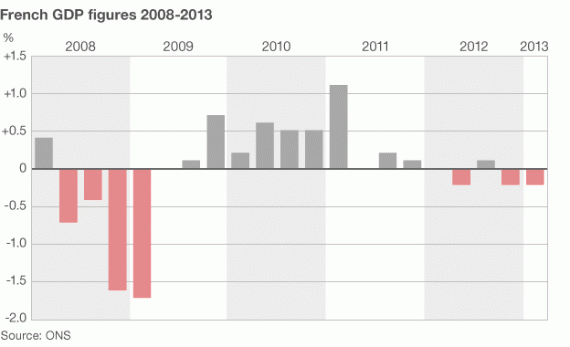French Dip
The French economy has drifted into recession for the second time in four years.
France’s economy has entered a recession for the second time in four years, a “double-dip” recession:
France has entered its second recession in four years after the economy shrank by 0.2% in the first quarter of the year, official figures show.
Its economy shrank by the same amount in the last quarter of 2012.
President Francois Hollande has said he expects zero growth in 2013, lower than a 0.1% growth forecast by the French government.
Separate figures showed that the recession across the 17-nation eurozone has continued into a sixth quarter.
A recession is defined as two consecutive quarters of negative growth.
The economy of the 17-nation bloc shrank by 0.2% in the January to March period, according to the EU’s statistics office Eurostat, with nine of its members now in recession.
Within the zone, France has record unemployment and low business and consumer confidence.
The euro is fundamental to France’s economic problems. The common currency strips from the French government a major weapon in boosting its own economy in times of downturn.
Much has been made of Portugal, Ireland, Italy, Greece, and Spain and other weak economies of the eurozone “periphery”, e.g. Cyprus (which has just received approval for a massive loan from the European Central Bank). The economic problems of the eurozone don’t end with those countries they merely begin there.
The real problem in the eurozone is Germany and its export-driven prosperity. Either the Germans must buy more from their eurozone neighbors or those neighbors must buy less from Germany or Germans must be willing to finance the spending of all of those neighbors. There really is no way around it.




I guess it is a measure of US optimism that the stock market continues to climb and gold continues to fall.
And France is the world’s 5th largest country by GDP, second (albeit a distant second) only to Germany in the EU. On a GDP/capita basis, though, it’s a real laggard, 25th in the world and 11th in Europe.
It’s probably been said too many times by too many people, but the Eurozone setup really seems to have the worst balance between federalism and sovereignty possible.
No, it´s not. The problem is low productivity and a lagging manufacturing sector. Germany did sensible things to boost their productivity and their manufacturing sector(Right investments in infrastructure, a healthy relation between business, unions and government, the right investments in Education), France, Spain, Italy, Greece, Portugal and Ireland did not, and they are paying the price.
By the way, unless you give vouchers for vacations in the Mediterranean in Germany there is little thing that increased consumption in Germany could do for the ailing areas of the Eurozone.
@James Joyner: These stats magnify the folly of the Euro.
And we continue to get good economic news. Perhaps President Obama is not the boob the Fox News Flock O’ Parrots makes him out to be.
@Andre Kenji:
They could replace the paltry yearly fee that countries pay to the EU with taxes that are then redistributed between countries, much like how the federal tax in the US is used to redistribute massive amounts of wealth between the states.
This thread’s title made me hungry 🙁
@Andre Kenji:
About the most inapplicable comment anyone can make. You’re here, actually arguing that all sixteen members of the eurozone should be competitive enough to run trade surpluses with each other which as anyone with a brain knows is impossible. For someone to be a net exporter someone else must be a net importer.
Next you’ll be claiming all fifty U.S. states should be net exporters.
Instead we get more ethnocentric “lazy southerners” drivel.
For those who think it’s due to lack of “competitiveness”, why weren’t Greece and Spain and Italy having this problem before adopting a foreign currency?
Why weren’t they in this situation when they had monetary sovereignty?
Why did this mess occur only after a major demand shock?
Why were there no solvency problems when each had a currency issuing central bank which controlled interest rates?
@PJ:
In the US, the disparities of income between the States were enormous until some decades ago(And that difference is getting smaller because many companies are building industries in the South and in the West). In fact, even today the difference of income between the states is huge(Delaware, that has the highest GDP per capita, has more than the double of the GDP per capita of Mississippi, the state with lowest GDP per capita). And the US economy is heavily interlinked: a city like New York is heavily dependent from food, energy and whatever else that comes from the rest of the country.
Besides that, Germany, Austria, Netherlands and a few countries with low population does not have enough funds to support the whole Europe.
@Ben Wolf:
Unlike most commenters here, I can read in Italian and in Spanish. Spain problems did not began with the adoption of the Euro, it began when a huge housing bubble that was developed for twenty years burst in 2007.
Greece´s GDP grew after they joined the Euro, the problems would only begins when investors began to discard Greek bonds.
http://www.tradingeconomics.com/greece/gdp
Regarding Italy, their economic problems predates the adoption of the Euro. They had faced low growth and high unemployment since the 90´s. There is a good BBC documentary about the issue, Good Italy, Bad Italy: Girlfriend in a Coma.
No. He is, correctly, arguing that trade is not charity and that, if you want to decrease import/export disparities, the net importer country will have to offer some export goods at competitive prices. Something that most Mediterranean countries cannot do due to high wages and low productivity.
They did (for a given value of “did”). Spain’s lending rate was consistently around 15% due to higher default risk until they joined the Euro area.
This is just not doable on a scale that will be acceptable to the richer countries. Germany barely managed to integrate the GDR without too many adverse effects (and became the sick man of Europe several times during the process). The total cost hovered around 2.6 Trillion Dollars for a country of barely 17 million citizens.Spain alone is nearly three times as big.
Per capita, in 2006, California sent $1,466 to other states.
Per capita, in 2007, Germany sent $152 to other countries in the EU.
In 2008, California had a GDP of $1,850,000 million, Germany had a GDP of $2,904,557 million.
@PJ:
1-) Germany is not California. Besides that, these numbers are inaccurate, because California is heavily dependent from infrastructure and workforce that is educated in other states. California sends their goods using railways and highways in other states, people educated in other states work there.
2-) Incidentally, Portugal´s railways are better than California´s:
http://www.skyscrapercity.com/showthread.php?t=155594&page=2
They used structural funds coming from the EU to do that.
By the way, there are problems in Europe in part because there are very different welfare and government systems in each country. There are different retirement ages and pensions systems on each country, and if you are willing to integrate these economies you would need to have a common pension system in the whole continent.
Obviously, bringing the retirement age in Spain and in Greece to be the same than in Germany would be considered austerity.